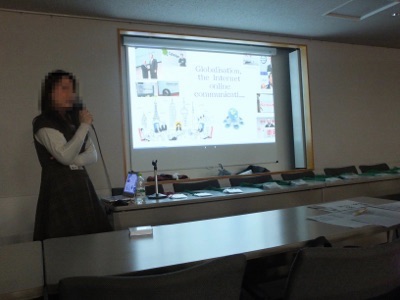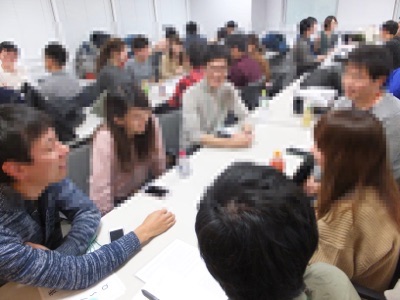第164回 WORKSHOP報告(12月16日) / 参加者80名
1.マテリアルの紹介

3.ディスカッション中の様子

::::::::::::::::::::::::::::::::::::::::::::::::::::::::::::::::::::::::::::::
《 今回のworkshop 》
○workshop参加人数:80名(うち新人の方:9名)
○【前半】:Being assertive beyond language
○【後半】:Emperor Akihito Stepping Down
:::::::::::::::::::::::::::::::::::::::::::::::::::::::::::::::::::::::::::::::::
≪FIRST HALF≫
Being assertive beyond language
Some Japanese people tend to face language difficulty in the business field due to globalisation, the Internet online communication and diversity of business. To respond to this phenomenon, some companies have tried to transform the traditional Japanese business model into a universal business model using an English-only policy. For instance, Rakuten (an Internet mall management company) and UNIQRO (a casual clothes chain shop) have changed their official language from Japanese to English (Sugimoto, 2014: 154). According to The Japan Times (2015), the phenomenon of English-only policies, which was described as the company calls ‘Englishisation’.
On the other hand, some English teachers in Japan are frustrated because Japanese students tend to be ‘silent and unresponsive’ (King, 2014: 232). One of the reasons is ‘social anxiety’ (King, 2014: 233). King, (2014) indicated that some Japanese English learners struggle with the dilemma of social performance and fear of negative evaluation by others. As a result, fear triggers heart palpitations, diaphoresis, shortness of breath and other negative effects in their bodies (Keefer, 2016). Although social pressures may trigger negative psychology, many Japanese people ignore it and identify that the person suffering mentally weak. Some Japanese experience English trauma (Ishikura, 2017).
To sustain development, Japanese people need to be more assertive in English beyond language. Assertive means ‘the quality of expressing opinions or desires in a strong and confident way, so that people take notice’ and is synonymous with confidence, and forcefulness (Oxford Dictionary). The opposite is submissive, which means ‘ready to conform to the authority or will of others; meekly obedient or passive’. Unfortunately, a famous Japanese dictionary translated ‘assertive’ as ‘断定的な、独断的な、自己主張の強い、自分に自信を持った、我の強い’. Little translation mistakes that caused big problems for Japanese English learners. Assertiveness has an important role as an instrument in conflict mode (Riasi, and Asadzadeh, 2015). Assertive people tend to be ‘open, honest, and respectful of others whilst also looking after their own needs’ (McBride, 2017). Although aggression and assertion have been confused, the meanings are totally different (Alberti, and Emmons, 2017). Aggressiveness is based on ‘me first, pushing others around, denying their rights’.
On the other hand, assertiveness is based on balance and ‘reflects genuine concern for everybody’s rights’ (Alberti, and Emmons, 2017: 7). Japanese learners of English need to learn to not only speak English fluently but also improve communication skills and express their ideas (Ishikura, 2017). When in Rome do as the Romans do.
Q1. Have you had any difficult situations in English, such as in school, at work, at house and during private time? Please share the experience.
Q2. Are you an assertive or submissive person?
Q3. Do you agree with ‘Englishisation’ movement? Why?
Q4. How can we make people more assertive in society to transform the traditional Japanese business model into a universal business model?
Reference
Alberti, R. and Emmons, M., (2017). Your perfect right: Assertiveness and equality in your life and relationships. New Harbinger Publications.
Keefer, L., (2016). Extinguishing Fear of Gastrointestinal Symptoms to Treat Functional Gastrointestinal Disorders. Clinical Gastroenterology and Hepatology, 14(11), pp.1559-1561.
King, J., (2014) 13 Fear of the True Self: Social Anxiety and the Silent Behaviour of Japanese Learners of English. The impact of self-concept on language learning, 79, p.232.
McBride, P., (2017). The assertive social worker. Routledge.
Riasi, A. and Asadzadeh, N., (2015). The relationship between principals’ reward power and their conflict management styles based on Thomas–Kilmann conflict mode instrument. Management Science Letters, 5(6), pp.611-618.
Sugimoto, Y., (2014). An introduction to Japanese society. Cambridge University Press.
The Japan times (2015). Rakuten forges ahead in English. Available: https://www.japantimes.co.jp/opinion/2015/05/23/editorials/rakuten-forges-ahead-english/#.WiNI0lVl-M8. Last accessed 23 Nov 2017.
Thomas, K.W., (2008). Thomas-Kilmann Conflict Mode. TKI Profile and Interpretive Report, pp.1-11. http://www.organizationimpact.com/wp-content/uploads/2016/08/TKI_Sample_Report.pdf
YOKO ISHIKURA. (2017). Freeing Japanese from English trauma. Available: https://www.japantimes.co.jp/opinion/2017/10/08/commentary/japan-commentary/freeing-japanese-english-trauma/#.WiNN3lVl-M8. Last accessed 23 Nov 2017.
≪LATTER HALF≫
Emperor Akihito Stepping Down
Questions
1.What role does the emperor have for modern Japan?
2.How did Akihito influence Japan and its image in the world during his reign?
3.Japanese emperors rarely address the people directly. Why do you think Akihito chose to do this now? How did you feel when you heard it?
4.What do you think of Akihito’s decision to leave?
5.Do you think an emperor should be allowed to abdicate?
6.This article is from a US news source. How would the article have been different in a Japanese news source?
Phrases
l abdicate his post – voluntarily choose to leave his leadership position
l Crown Prince – the prince who is already decided to be the next leader
l has assumed…duties – has started to do jobs
l carry out my heavy duties – complete my difficult tasks
l whitewashing – presenting in a way that hides the worst things
l broke…tradition – did things differently from in the past
References
http://edition.cnn.com/2017/11/30/asia/japan-emperor-akihito-abdication-intl/index.html
Akihito to become first Japanese Emperor to abdicate in 200 years
By Kaori Enjoji and Ben Westcott, CNN
Updated 0723 GMT (1523 HKT) December 1, 2017
Tokyo (CNN) Japan’s much-loved Emperor Akihito will stand down on April 30, 2019, becoming the first Japanese monarch to abdicate his post in two centuries.
The decision was made at a meeting of the Imperial House Council and announced by Japanese Prime Minister Shinzo Abe on Friday.
Crown Prince Naruhito, who has already assumed some of his father’s duties, will take on the role on May 1, 2019, becoming the 126th Emperor to ascend to Japan’s Chrysanthemum Throne.
“I will do my upmost to ensure that the Emperor’s abdication and the ascension of the Crown Prince will proceed smoothly with the blessing of all of our citizens,” Abe said.
In Tokyo on Friday locals expressed their sadness at the loss of their Emperor but pride in how he’d help mold the country in his image.
“He became emperor when Japan was looking for a new national identity and I think his commitment to peace became symbolic of how Japan tried to be perceived in the world. I hope that will continue,” Satomi Kitamura told CNN.
Bank worker Kenichiro Yasuda said he felt a “sad” at the news. “But he is getting older so I understand. It is good that his son is ready,” he said.
In August 2016, Akihito gave a rare televised address, where he said his age and fitness level could make it “difficult” to carry out his duties in the future, a plea many took as a request to step aside.
Following his speech, the Japanese parliament in June passed into law a historic bill to allow 83-year-old Akihito to abdicate the throne if he chose.
“When I consider that my fitness level is gradually declining, I am worried that it may become difficult for me to carry out my duties as the symbol of the State with my whole being as I have done until now,” he said in 2016, only the third time a Japanese emperor has addressed his people since 1945.
Emperor Hirohito announced by radio that Japan lost World War II and Akihito, his son, addressed the nation on TV after the Fukushima nuclear disaster in 2011.
The emperor is a ceremonial but revered figure in Japan’s constitutional monarchy. It is currently the oldest hereditary monarchy in the world, dating back fourteen centuries. Akihito himself is a direct descendent of Japan’s first emperor Jimmu, believed to have reigned around 660 BC.
The last emperor to abdicate was Emperor Kokaku in 1817 in the later part of the Edo Period. In general, Japan’s monarch is not allowed to step down under Japan’s legal framework.
Akihito, who was born in December 1933, had been suffering health problems in recent years, including heart surgery and treatment for cancer, which he addressed in his 2016 speech.
“I started to think about the pending future, how I should conduct myself should it become difficult for me to carry out my heavy duties in the way I have been doing, and what would be best for the country, for the people, and also for the Imperial Family members who will follow after me,” he said.
Akihito’s father was the wartime Emperor Hirohito who presided over Japan’s aggression in the first half of the 20th Century.
Akihito has repeatedly expressed remorse for his country’s actions before and during World War II, including during his visit to China in 1992, the first ever by a Japanese monarch, although he did not apologize.
“At odds with much Japanese behavior of recent years, ranging from prime ministerial visits to the Yasukuni Shrine, which enshrines war criminals among others, to whitewashing Japanese atrocities in school textbooks, Akihito has been expressing remorse and making gestures of repentance that convey Japan’s contrition regarding the nation’s regional rampage,” Jeff Kingston, director of Asian studies at Temple University Japan, wrote for CNN in 2016.
His son Naruhito has stood by his father’s stance on Japan’s wartime atrocities, saying his country’s activities during the war must be remembered “correctly.”
“It is important today, when memories of the war are fading, to look back humbly on the past and correctly pass on the tragic experiences and history Japan pursued from the generation which experienced the war to those without direct knowledge,” he said at a press conference in 2015.
Akihito broke more than 1,500 years of imperial tradition by choosing in 1959 to marry a commoner, Michiko Shoda.
His son followed his example in 1993, marrying Harvard-educated diplomat Crown Princess Masako. However, soon after the wedding, Masako began to suffer a stress-related illness and grew reclusive, much to the concern of local observers.
A multilingual former career diplomat, Masako is said to have struggled with the transition to royal life.
“One can only hope that she would be able to provide the stalwart support for Naruhito that Michiko has given to Akihito,” Jeff Kingston, director of Asian studies at Temple University Japan, told CNN in 2016.
***********************************************************
私たちと一緒に英語コミュニケーション能力を鍛えませんか?
ご興味を持たれた方は、
入会申込フォーム
https://english-speaking-club.com/cms/?page_id=93
よりお申し込みください。お待ちしています!
***********************************************************